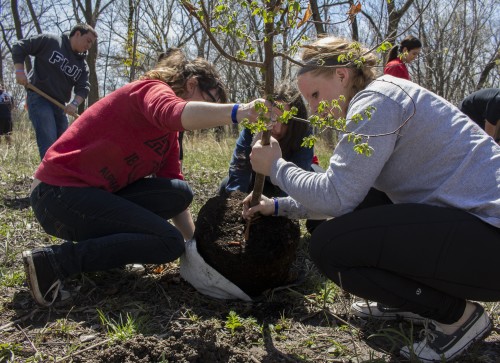
Waking up at 4 a.m. is not unusual for Jessenia Martinez, a senior at DePaul. It’s even enjoyable. On a cold and icy January morning, rather than staying in bed, Martinez was up and ready to volunteer for her first race of the year. Since January she has volunteered her time at 10 different events and she is still counting.
“My middle school had required hours and we took out learning service hours so we did 40 (hours) before we graduated from middle school,” Martinez said. “My high school also required community service hours, so I graduated with 300 plus hours of learning service and so that was a lot of fun for me.”
When Martinez began attending DePaul, an endless amount of volunteering opportunities came her way. She volunteered for at least 40 organizations multiple times within the last four years. She volunteered with kids, community gardens, conventions and concert venues. She has also helped races such as the Shamrock Shuffle, the Rock N’ Roll race and the Color Run.
According to a well-being research study conducted by Gallup, people who volunteer their time to community service are happier than people who do not. Volunteerism to many people is much more than serving hours.
Volunteers said also changes a person’s attitude about issues because he or she is actually doing something active instead of just reading or listening about it.
“Research in social psychology shows that our attitudes change towards something when we are directly experiencing it,” Joseph Ferrari, a professor of social community psychology at DePaul, said. “I think people feel good, which is why you want to encourage volunteerism; you want to encourage service learning kinds of experiences ‘cause it changes people’s attitudes.”
Institutions like DePaul have service days for their students, staff, faculty and even alumni to participate annually. On the first Saturday in May over a thousand DePaulians participate in a day of service with more than 100 community partners.
Ferrari said that Americans today are volunteering more now than they ever have before.
“It all depends on how you define volunteerism,” Ferrari said. “People today are more likely to write a check for a charity than actually go and serve.”
Ferrari said people volunteer for a number of reasons. Some are selfish reasons, which is not a bad thing, and the others are selfless reasons. For one, volunteering brings joy to people’s lives, to be able to be with other people in such a social setting.
Martinez, for instance, loves the social aspect of volunteering. She likes to meet people and see how her friends react to volunteering with her. Her favorite volunteering experience to this day has been the Walker Stalker convention, where she was a celebrity escort for the actors of the Walking Dead show. She was able to get autographs and meet a lot of new people.
“It was the first time they were having it in Chicago. I didn’t know what I was getting into but I’ve never met such amazing volunteer coordinator and I loved just being there; everyone was so nice,” Martinez said. “This year I’m going to hopefully get to do the same thing, and I will get to be a zombie.”
People also volunteer their time to charity work to get career experience.
“I find many people to say, ‘Yes, I joined a community volunteer because it looks good on the resume’,” Ferrari said. “So that’s kind of a selfish reason. It’s not a bad reason; it doesn’t make the person bad.”
Another selfish reason is protection, which is the notion of people believing that they should help through volunteerism because in the near future they may be in a situation where they might need the help themselves.
Like Martinez, Selena Boundy, a junior, loves volunteering her time with the Lambda Theta Alpha Latin sorority at DePaul. She has worked with senior citizens and at St. Jude Children’s Research Hospital. She and her sorority have written letters to patients at the research hospital and have raised money through events like a masquerade ball and a fashion show.
“What I like is that it brings us closer together for a good cause just because I feel a lot of my sisters and my sorority chapter, we all come from different parts of the city and we all love to volunteer and help others,” Boundy said. “I feel like helping others is not just something you do just for fun. I think you should do it because I feel like that’s what a human being should do.”
People like Boundy who believe helping others is something that is expected of people is another reason people volunteer a lot.
Ferrari said that believing that volunteerism is part of humanity is a selfless motive to give the time and energy to helping others. Another motive as to why people volunteer has to do with showing values as a culture or as individuals.
Ferrari believes community service should not be a one-time deal and that people should try to volunteer for longer periods of time if they can. People like Martinez who have done community service for a long time, in her case since her early teens, means that the overall volunteering experiences are much more valuable.
“The longer you have the experiences, the better the learning, the better the outcomes, the more positive the experience the person has,” Ferrari said. “So service days are nice. They’re not as powerful as having a service week, a spring break trip or a whole quarter, but it’s better than nothing.”
Martinez is used to volunteering with people she knows, but has recently decided to continue volunteering even if she does it on her own. As long as she doesn’t stop volunteering, which based on Ferrari’s research, is a good thing.
“I just told myself, ‘You know what? I should just continue volunteering with or without people because this is something I’m really passionate about’,” Martinez said.

